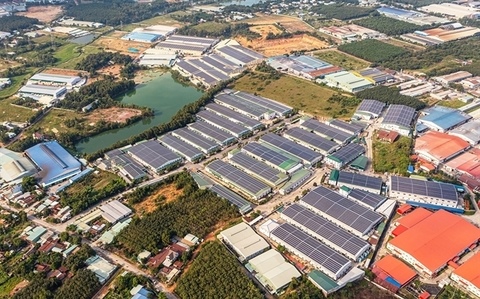|
Global minimum tax to affect industrial property market
The adoption of the global 15 per cent minimum tax provides the opportunity for industrial zones to upgrade their operation models in line with the country’s new foreign direct investment (FDI) attraction strategy.

A view of Nam Tân Uyên Industrial Park in Bình Dương Province. — VNA/VNS Photo Hồng Đạt
|
The industrial property market is expected to see considerable changes as a majority of its customers are FDI companies.
Despite the stagnant real estate market in 2023, the industrial property is robust thanks to strong FDI influx, Đoàn Duy Hưng, chairman of industrial property portal iipvietnam.com said.
The global minimum tax means that multinational enterprises (MNEs) will have to pay top-up taxes, forcing them to consider moving their production out of Việt Nam which might result in a decline in demand for industrial property, he said.
“There are challenges. But there are opportunities,” he said, adding that the global minimum tax will create a fair playing ground for both FDI and domestic enterprises.
This is also an opportunity for Việt Nam to shift its FDI attraction strategy away from the race of offering tax incentives, but creating a favourable, transparent and predictable business environment, he said.
According to Nguyễn Hữu Trang, director of IIP Bắc Hưng Hải Joint Stock Company, the global minimum tax adoption is an opportunity for Việt Nam to upgrade the operation models of industrial zones in line with the country’s new FDI attraction policy.
As the focus of Việt Nam’s new FDI attraction policy is promoting green economy, circular economy and sustainable development, there will be a transition from tax incentives towards improving institutions and policy framework, enhancing human resources quality as well as support in infrastructure.
Industrial zones should refocus their investment attraction strategies to industries of competitive advantage and green transition, he said.
“The global minimum tax will affect the industrial property market to some extent; there are both challenges and opportunities,” Trang said,
Expert Vũ Đình Ánh said that the industrial property would continue to develop strongly in 2024, driven by the FDI influx which is expected to continue. Besides, industrialisation is a good opportunity for the development of this market.
Ánh pointed out three factors for the bright prospects of the industrial property market.
First, the Government’s macro policies will promote the recovery of production and business. Second, many important infrastructure projects will be implemented in 2024, such as the first phase of Belt Road No 4 in HCM City, HCM City – Mộc Bài Expressway.
Third, Việt Nam is expected to continue to be an FDI magnet, which will help the industrial property market to stay robust despite economic difficulties.
New models
According to Nguyễn Công Ái, deputy director general of KPMG, in the context of global economic restructuring and supply chain restructuring, industries which are attractive to FDI will be automobile, electronics, semiconductor, logistics, and food and beverage.
The model of eco-industrial zones which integrates logistics, warehouse, port, urban infrastructures and services and smart systems will help attract foreign investors to Việt Nam.
While eco-industrial zones are a vital trend, the transition remains slow due to the limited financial resources, Lương Trọng Nguyên, deputy head of Dung Quất Economic Zone’s Management Board, said.
Lê Minh Nghĩa, chairman of Việt Nam Financial Consultants Association, said that the transition towards green economy and circular economy in industrial zones is essential for Việt Nam to achieve net zero by 2050.
However, the credit policies for implementing eco-industrial zones remained vague, he said.
“If there is no timely capital to promote the development of eco-industrial parks, Việt Nam may miss the wave of green investment which is an increasing focus of international investors,” Nghĩa said.
Statistics of the Việt Nam Association of Realtors showed that there are 412 industrial zones across Việt Nam, 293 of which are operational while 119 are under construction.
The leasing rates increased by around 20 per cent last year.
The association said that Việt Nam remains an attractive destination for investment.
It is forecast that there will be 500 hectares of industrial land added in 2024 and 2,800 hectares by 2027.
Bizhub
|